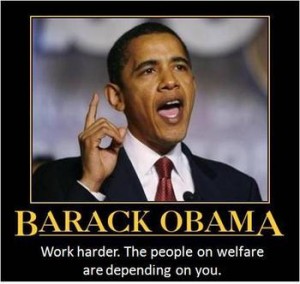I’m part of a just-posted online Debate Club sponsored by U.S. News & World Report which asks “Is the United States a Nation of ‘Makers and Takers?’”
My contribution to the discussion is basically a reworked version of what I wrote last week about Romney and the infamous 47 percent remark, so there’s no need to regurgitate those remarks. Suffice to say that I gave an answer of “No” because Americans don’t (yet!) share the European belief that it is government’s responsibility to provide the basics of life.
What’s interesting is that the two other participants in the debate (Phil Kerpen and Scott Winship) who are closest to my views answered “Yes,” while the three leftists sided with me and voted “No.”
But not because the leftists agreed with me on policy, or because I disagreed with Phil or Scott. I think the strange divergence is a result of me being very literal (some would say pedantic) about the question that was asked while the rest of the participants addressed the broader issue of whether there’s too much or too little means-tested redistribution.
So allow me to take a moment to elaborate on my remarks. My answer was driven by my belief that American exceptionalism – limited government, self reliance, and personal responsibility – is still real. I linked above to one poll comparing American and European attitudes, but I also invite you to review very important polling data here and here.
But I’m not under any illusions that this is a permanent feature of the U.S. political landscape. People can be lulled into dependency. Indeed, some leftists are very honest about admitting their desire to turn more and more Americans into wards of the state. Bill Clinton’s pollster wrote a book in the 1990s in which he explicitly acknowledged that part of the debate over Hillarycare was about the degree to which the middle class would have to rely on the federal government.
And a recording of Barack Obama from 1998 has recently surfaced, and it reveals both an ideological and a political desire to expand government dependency. Here’s an excerpt from the Daily Caller.
The Daily Caller has obtained a complete audio recording of the October 19, 1998 Loyola College forum on community organizing and policymaking during which a future President Barack Obama said he favored the government redistribution of wealth. …Obama also said he viewed welfare recipients and “the working poor” as “a majority coalition” that could be mobilized to help advance progressive policies and elect their champions. …The full recording reveals that Obama saw welfare recipients and the working poor in Chicago as a “majority coalition” who could be leveraged politically.“What I think will re-engage people in politics is if we’re doing significant, serious policy work around what I will label the ‘working poor,’” he said… “They are struggling. And to the extent that we are doing research figuring out what kinds of government action would successfully make their lives better, we are then putting together a potential majority coalition to move those agendas forward.”
Set aside the policy arguments here about redistribution undermining progress in the fight against poverty and making it difficult for the less fortunate to climb the economic ladder.
What’s significant is the extent to which Clinton’s pollster and Obama both explicitly talk about redistribution as a political tool. Take money from a minority (i.e., class-warfare tax policy) and give it to enough voters to create a political majority.
I hate to admit it, but the evidence from Europe shows this can be a successful political strategy.
 The only downside – as shown in this parable about beer and this great Chuck Asay cartoon – is that the scam only works so long as there are people willing to get fleeced.
The only downside – as shown in this parable about beer and this great Chuck Asay cartoon – is that the scam only works so long as there are people willing to get fleeced.
I once argued on TV that leftists should be careful not to be too greedy because it doesn’t make sense for parasites to kill their host animals. And Michael Barone made the same point in a more eloquent fashion.
But I think this analysis is flawed. The Greek politicians who created the welfare state were very successful in buying votes. They’re now out of office, either dead or retired with fat pensions, as the house of cards is collapsing.
So if you’re Obama or some other current-day politician (and assuming you don’t care about the future), what’s the downside of expanding the burden of government spending?
